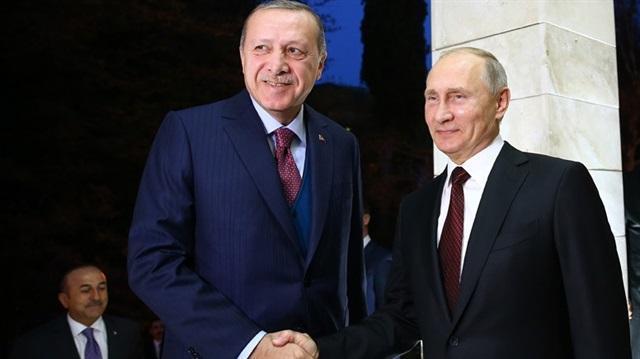
Turkish President Recep Tayyip Erdoğan and Russian President Vladimir Putin will attend a symbolic ground-breaking ceremony for Turkey’s first nuclear plant on the Mediterranean coast at Akkuyu, while also chairing a High-Level Cooperation Council meeting on April 3.
The two presidents will hold a video teleconference during the groundbreaking ceremony for the power plant, which will be built by Russia’s Rosatom in the southern province of Mersin for a price tag of $20 billion.
The ground-breaking ceremony for Akkuyu will be “a response” to those who say there is no safety of life and property in Turkey for foreign investors, Erdoğan said on April 2.
The parties are still trying to clear obstacles that impede the Akkuyu project as they seek the necessary permissions and finalize the partnership structure. Rosatom holds a majority share in the plant with 51 percent, while the remaining 49 percent stake was originally planned to be divided between a Turkish consortium of three contracting conglomerates under the name Cengiz-Kolin-Kalyon (CKK).
Kolin and Kalyon recently decided to pull out of the project, citing an inability to agree on commercial terms. Rosatom has said it is engaged in talks aiming to bring in Turkish state electricity producer EÜAŞ as a new shareholder in the project.
The plant will have a capacity of 4,800 megawatts in four units and a working life of 8,000 hours per year. In the first phase of the construction, two units with a capacity of 2,400 megawatts are planned.
Beyond the Akkuyu Project, Ankara and Moscow have been forging increasingly close economic ties as the two coordinate to find a solution to the war in Syria.
In December, the two countries finalized an agreement for Turkey to purchase Russia’s long-range S-400 missile defense system, which has raised eyebrows among some of Ankara’s NATO allies. The two countries are also building the “Turkstream” pipeline to transport Russian gas to Turkey.
Turkey and Russia’s conflicting interests in Syria had led to the downing of a Russian warplane by a Turkish jet at the Syrian border in November 2015, which put the two nations on the verge of a direct military conflict. However, Ankara and Moscow managed to gradually overcome the dispute and have now established solid bilateral ties.
Despite previous political rivalry, in recent years Ankara has developed closer political ties with Moscow, particularly in Syria, amid growing tension between Turkey’s NATO partners and Russia. Putin and Erdogan have met several times in the past year and have regularly spoken on the phone in recent months.
Last week, Turkey announced that it would not be following NATO and EU allies in ousting Russian diplomats in response to the poisoning in Britain of a former Russian spy. Turkey condemned the nerve agent attack on British soil without naming Russia.
“Just because some countries have taken a step based on an allegation, we don’t have to take the same step,” Erdoğan said, noting that Ankara enjoys “positive” relations with Moscow.
Russia, Turkey and Iran, as the guarantor countries of Astana process, are also working together to create “de-escalation zones” purportedly aimed at reducing fighting in Syria and bringing all sides in the conflict together to negotiate Syria’s future.
The cooperation comes despite their positions on opposing sides in the Syrian conflict, with Moscow siding with Syrian President Bashar al-Assad and Turkey supporting his foes since the start of the Syrian war seven years ago.
Erdoğan and Putin, accompanied by several ministers, will attend a Turkey-Russia High-Level Cooperation Council meeting in Ankara on April 3, while on April 4 the two leaders, along with Iranian President Hassan Rouhani, will hold a summit in Ankara to discuss Syria’s future.